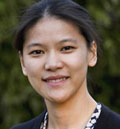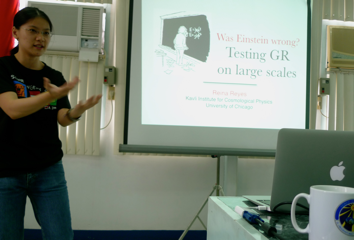Women's HERstory Month Day 22: The Woman who Proved Relativity

by Nikka Santos
Posted on 03/19/2012 2:12 PM
MANILA, Philippines - Think of Filipinos who have astounded the world lately, and the first names that come to mind are likely to be Manny Pacquiao or Charice. The two definitely earned their Pinoy-pride accolades, but they aren’t the only ones who deserve it.
Meet Reinabelle Reyes, a 28-year-old astrophysicist who astounded scientists all over the world when she proved Einstein’s Theory of General Relativity on a cosmic scale. That was when she was only 26.
Einstein’s theories have been verified many times, but it took Reyes and her Princeton University collaborators to verify his Theory of General Relativity, beyond the confines of our solar system.
Led by Reyes, the research team made headlines back in 2010 when they showed how galaxies up to 3.5 billion light years away are clustered together in exactly the way General Relativity predicts. They came up with a new astronomical measurement, which indicates how galaxies are pulled together by gravity, just as Einstein theorized.
Her findings also support the existence of Dark Energy-a force greater than gravity once merely imagined by scientists. This is a big deal, because, even NASA tells us, pinning down the exact properties of Dark Energy is among the most significant problems facing science today. According to the NASA website, Dark Energy “is the deepest mystery in physics, and its resolution is likely to greatly advance our understanding of matter, space, and time.”
Reinabelle Reyes is among the scientists involved in unraveling this profound mystery.
Studying the stars
She was in Manila recently to give a series of talks, and I had the chance to catch up with her at the Manila Observatory in the Ateneo Loyola campus. She is a graduate of the Loyola school herself, earning her BS Physics Degree from Ateneo and graduating summa cum laude-before getting her PhD in Astrophysics from Princeton.
Today, Reyes is a fellow at the University of Chicago’s Kavli Institute for Cosmological Physics. It’s a fine opportunity for any physicist to be where she is right now, but she is intent on coming back home one day.
She says she will always have a passion for studying the stars. Yet admits she wouldn’t be fulfilled if she didn’t work on more immediate earth-bound problems-especially since she comes from a country with a long list of them.
When we met, I had almost missed her. Dressed in jeans and a T-shirt that said “Schrodinger’s cat is a zombie,” she looked more like a student. Among a myriad of other things, she told me who Schrodinger was. This girl is passionate. If we weren’t pressed for time, she could have gone on and on about the country’s lack of disaster preparedness and improving K12 education in the Philippines. The country needs more scientists! Eventually, she hopes to be part of the solution.
As her schedule was packed, we had to continue our conversation over e-mail, a portion of which appears below. Some of the things she was candid about-winning the Nobel Prize, disproving Einstein, the arrogance of scientists, God, and the Dalai Lama.
In a way that non-scientists can understand, how exactly did you come up with a confirmation of Einstein's Theory of General Relativity?
Every theory makes predictions, and to pass the test of science, these predictions must match what we observe. In our study, we combined different types of observations of 70,000 galaxies and compared the result with the prediction from Einstein's theory. They match! So we say that we have confirmed the theory.
What's special about this test is that it could have gone another way. That is, the answer could not have matched the prediction-and that would be a signature of new physics, a signal that Einstein could be wrong. Right now, I'm part of a team of scientists working on a new and bigger galaxy survey called the Dark Energy Survey (DES). This means that in 2017, we will be able to do the test again, and put Einstein's theory to an even more stringent test, so stay tuned!
So maybe you could get the Nobel in 2017 or 2018?
There is potential for a Nobel Prize-winning work here -- but one, it won't go to me, it would go to the senior scientists who lead the team. Two, it would be awarded many, many years after. Recall that most laureates get them in their 70s and 80s for work done in their 20s or 30s!
How do you think your childhood shaped you as a scientist?
I credit my parents for exposing me to books and computers at an early age. My mom was an early adopter of the home computer and I played educational games-in DOS!-as a kid. I also learned how to touch type with a Mario Bros typing game. It's a skill I now get to use and take advantage of every day.
I had no pressure to do well in school, but I did get encouragement at crucial points. In kindergarten, I apparently got bored because I already knew what the teacher was teaching and my mom told me that I should raise my hand and participate in class. This got me on the honor roll, but more importantly, it saved me from being disenchanted from school.
Does being a woman or a Filipino make it more difficult in some ways? It’s still a male-dominated field.
Astrophysics is actually one of the relatively better off fields, with 30% women in postdoc positions (me included), and 15% in tenured faculty positions. The figures are even lower for theoretical particle physics, for example.
I should say that here in the Philippines, we don't have quite the same problem that the US and the West have. For example, there, there is a strong stereotype of the White, male scientist. In our society, we don't even have a public image of a Filipino scientist, much less a stereotype-except those acquired from the West, which, of course, is also problematic.
I find that one significant difference is that our society has no problem with women leaders, not only in the sciences. I can see and feel this difference, especially during my recent visit to Manila, after 5 years of living in the US.

COMMUNICATING. Relaying data to the public through visuals matters.
Disaster preparedness and improving science education are problems you hope to solve some day. Why these problems in particular? Can you let us in on some of your plans, as to how you can contribute to addressing them?
I'm particularly passionate about communicating data to the public in a way that is both attractive and easy to understand. One particular way to do this is through visuals, that is, through "data visualization."
As a scientist, I look at graphs all the time. In fact, I make them all the time. I understand that a typical graph I look at will not make sense to you, as is. But I can also make graphs that are beautiful and at the same time tell a story to the reader, all the while showing the power of data in improving our understanding of the world. This, for me, is the exciting art and science of data visualization.
I've started making my own infographics and plan to do many more, covering a wide range of topics, including disasters, demographics, economics, and even sports. Watch out for them in my data visualization blog on Rappler, coming out soon!
What do you do when you're not being a physicist? What excites you aside from the thought of one day having a 30-meter telescope?
I read a lot. I follow blogs. I follow basketball. I'm excited by the prospect of another championship for the San Antonio Spurs!
Of course you like to read! Favorite books?
Some books that made an impact on me, in no particular order:
Contact by Carl Sagan. The movie with Jodie Foster is not bad either, but different from the book and finished after Sagan's death.
Letters to a Young Poet by Maria Rainer Rilke speaks to my soul.
Novels of Haruki Murakami stimulate my right brain and induce vivid, "weird" dreams.
Nonfiction of Malcolm Gladwell-Tipping Point, Outliers, his New Yorker articles.
Ilustrado by Miguel Syjuco. I re-read it in preparation for my visit to Manila. I look forward to his next work.
What I'm reading now is the debut novel of Fil-Am author Alex Gilvarry, From the Memoirs of a Non-enemy Combatant. The protagonist is a Filipino "fashion terrorist" in New York. Very refreshing to see a fully fleshed out Filipino character, in a work filled with insight, humor, and heart.
In an article, I read you had mentioned reading Ethics for a New Millennium by the Dalai Lama.
I think the Dalai Lama's message of compassion is a good one to hear and heed. I'm impressed with his openness to dialogue with scientists-in particular, he has encouraged Buddhist monks and scholars to collaborate with neuroscientists to better understand our minds.
Scientists are usually skeptical about God. Do you believe in God? Does your work prove to you that he exists or does it make you think more critically about religion?
I don't personally believe in God. I think science does make one more critical of religion, but I also understand faith. It's just that I don't have any, at least not in a higher Being. - Rappler.com
Reinabelle Reyes wants more of us to understand science and how it operates in our lives.
http://www.rappler.com/move-ph/2686-the-filipina-who-proved-einstein-right
We don't often get many stories about great women scientific minds, except Madame Curie. Figured this was due!